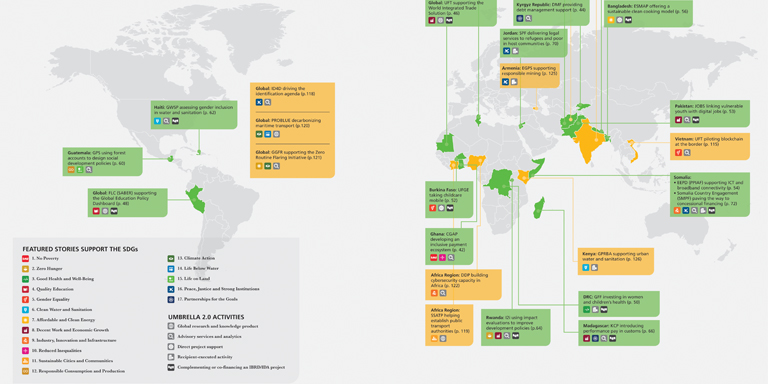
In 2019 the WBG’s Independent Evaluation Group (IEG) evaluated knowledge flow and collaboration within the World Bank. A key recommendation was to better link the Bank’s Regions and the Global Practices to improve coordination and enhance responsiveness to client countries. In response, Bank Management has spent the last two years remapping region-facing Directors, Practice Managers, and staff from the Practice Groups to the Regions to help embed knowledge and expertise in country-level operations.
The World Bank today operates out of more than 160 offices worldwide. An increased presence in client countries is helping the Bank to better understand, work more effectively with, and provide more timely services to its partners in those countries. The Bank has realigned senior responsibilities within the Global Practices to strengthen links and cooperation between the sectoral and regional teams, while maintaining the flexibility of the renewed delivery model. This is also expected to enhance contestability as well as the quality of the Bank’s knowledge products.
As part of this realignment, a large portion of the IBRD/IDA trust fund portfolio has been remapped to the Regions. This move, along with the continuing efforts of operational business units to consolidate their trust funds into fewer Umbrella 2.0 Programs, will allow the Bank to mobilize resources more efficiently and effectively to help client countries achieve their development mobilize resources more efficiently and effectively objectives, including the 17 SDGs. Larger, consolidated programs will have greater flexibility to be strategically aligned and responsive to country needs. The Bank will be able to integrate trust fund activities into its annual strategy and planning processes, intermediating the supply of trust fund resources managed by Global Practices, and ensuring this is informed by client needs garnered from the Regions' engagement with client countries.
Trust funds combine the advantages of multilateral aid (such as larger geographic presence, economies of scale, lower administrative costs, and proven implementation capacity) with those of bilateral assistance (targeted assistance in areas such as fragile situations where development partners have limited or no presence). Trust funds can also bring down transactions costs and reduce the proliferation of bilateral programs. Channeling trust funds through multilateral institutions can also facilitate the integration of global priorities into country programs.
Trust funds enable the Bank to expand and complement its lending program in several contexts, such as when the Bank’s resources are limited by IDA’s assistance envelope—in FCV situations, for example—or by the availability of IBRD’s lending resources. They can extend the Bank’s reach to countries in arrears, those that are not members of the Bank, and non-state recipients such as civil society organizations, which cannot receive direct funding through regular Bank instruments (IBRD loans and IDA credits and grants). Trust funds also enable the Bank to provide immediate assistance in response to natural disasters and emergencies; to scale up work on global public goods, such as climate change, communicable diseases, and knowledge about development; and to pilot innovations that are later mainstreamed into the Bank’s operations.
Every Practice Group, Region and Thematic Area in the World Bank employs trust funds to serve clients in these ways, as illustrated by the results stories in this chapter, as well as Chapter 6. They demonstrate results achieved during the past five years and directly contribute to all 17 SDGs. Featured activities are organized by the Practice Groups that align with these SDGs and are presented under the new Umbrella 2.0 Program in which each activity now resides. For newly named Umbrellas, the forerunner trust funds that now anchor the umbrella programs supporting the activities are also indicated in the stories.
Interview with Stefan G. Koeberle, Director Strategy and Operations, MNA Region, The World Bank Group
Link: https://youtu.be/m-tJQVh8hQY
Interview with Ethel Sennhauser, Director Strategy and Operations, The World Bank Group
Link: https://youtu.be/ZRZrs_-nV8Q
